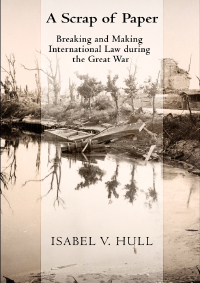Isabel Hull sheds light on laws of war in 'A Scrap of Paper'
By Daniel Aloi

Historian Isabel Hull’s new book, “A Scrap of Paper: Breaking and Making International Law During the Great War” (Cornell University Press) considers the importance of international law to the conduct in World War I by Imperial Germany, Britain and France.
Hull, the John Stambaugh Professor of History at Cornell, shows how Germany, the Western Allies and neutral countries interpreted international law – and especially the laws of war – before and during the war. She also counters the received view that law was immaterial to the war. “Post-1919 writings, academic and popular, have resolutely denied or obscured … that international law was central to how and why the Great War was fought.”
After Hull’s previous book, “Absolute Destruction: Military Culture and the Practices of War in Imperial Germany” (Cornell, 2004), she says, “I was assigned to write an article on military necessity in the late 19th and early 20th centuries. I discovered that the German view of military necessity was radically different from that espoused by other countries. I wondered if that difference was also true in practice.”
Hull set out to compare Germany, the great land power, with Great Britain, the great sea power, in their conduct of war. Voluminous diplomatic and military correspondence in the British Foreign Office’s archives revealed “what an enormous subject international law was during the war.” She widened her focus to include France (Britain’s ally, which shared Germany’s continental understanding of law) and the main methods of land and sea warfare, occupation, the introduction of new weapons (such as gas, aerial bombardment and submarines) and the use of reprisals.
The title “A Scrap of Paper” refers to German chancellor Theobald von Bethmann Hollweg’s description of the 1839 treaty guaranteeing Belgian neutrality – “a foundational document of European peace, security and law,” Hull says. “Germany’s breach of that treaty [which precipitated Great Britain’s entry into the war] said volumes about Germany’s regard for the sanctity of international law.” That violation, and the legal precepts behind many of Germany’s military and naval methods, were highly important, since “what a state practices is what sustains, breaks or potentially makes the law.”
Germany had developed its own view of the laws of war in part because it had honed “a method of warfare that was different from that of the other powers,” Hull says. “And the position of the German military was both more independent and more prestigious than in other places, including its ally Austria-Hungary. Other powers were more likely to recognize legal limits to military action in time of war.”
A country’s interpretation of international law, she says, is “an important indicator of the nation or state’s regime; it tells you what a state is and how it usually acts. And it’s important to public opinion – then and now.”
“During the first world war, people were watching; the really big scandals – for example, the massacre of civilians in Belgium and elsewhere, the sinking of the Lusitania, the burning of Louvain – had to do with international law,” Hull says. “We’ve forgotten all of this legal stuff in part because of strenuous efforts to forget it.”
After the war, “Germany ran a highly successful secret campaign that enlisted historians in order to counter the Allies’ insistence that Germany had broken the laws of war and international treaties. The historical record was muddied, and continues to be muddied,” Hull says. “That argument that the war was stumbled into as the result of stupidity and sleepwalking is completely unsustainable. The stakes were very, very high – as high as they were in World War II.”
“The first world war was a fight about how the world should run,” she concludes. “It ended too inconclusively to settle that question, which was posed again and partly settled in World War II.”
Media Contact
Get Cornell news delivered right to your inbox.
Subscribe